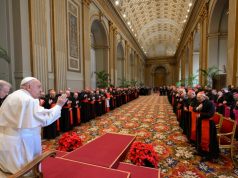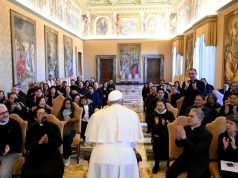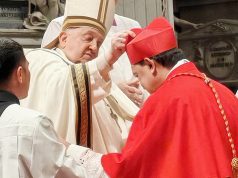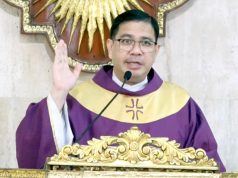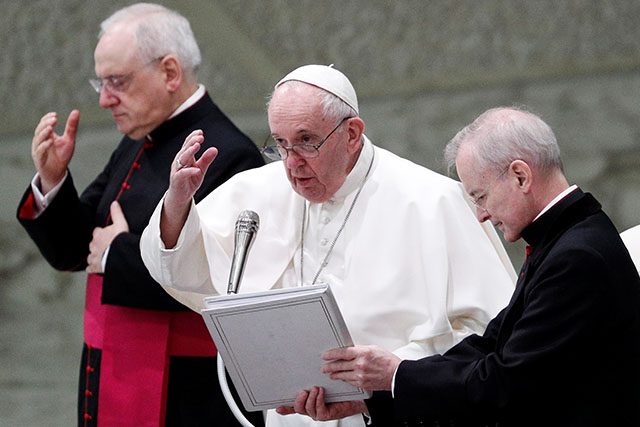
A Vatican expert and the editor of a Catholic-oriented news outfit who specializes in covering the Vatican explained that Pope Francis‘ much-reported remarks in a documentary shows his openness to civil unions between same-sex couples but adamant that sacramental marriage remains between opposite sexes.
John Allen Jr. in an interview with a news magazine television program on New Evangelical Television said the pontiff had only reiterated his previous stances about “regularizing the legal standing of other forms of cohabitation.”
Allen said on “Currents News”:
“What Pope Francis said in his documentary is completely consistent with things he has said both before and after his election to the Papacy, when he was president of the Argentine Bishops Conference, and as the cardinal of Buenos Aires in the early 2000s, when Argentina was facing a debate over the legalization of gay marriage, then-Cardinal Bergoglio said that in his opinion, it shouldn’t be marriage but civil unions would be a perfectly legitimate alternative.”
RELATED: Pope says same-sex couples should be covered by civil union laws
In 2017, the pope was asked if he was open about the marriage of same-sex couples. He answered that while he was in favor of “civil unions,” marriage should only be reserved between a man and a woman because “it’s the nature of things.”
He also voiced a similar stance in 2019 when he said that he has “always defended doctrine” and added that “it is a contradiction to speak of homosexual marriage.”
But the pope additionally said that “homosexual persons have the right to be in the family” at that time.
Allen stressed that the pontiff’s views about same-sex marriage have not at all changed despite the “hype” created in light of the documentary released on October 21.
“His comments in this film have to do with how do you legally recognize factual relationships among people. I think his concern has always been that with the language of gay marriage, and when he starts talking about gay marriage, because in his opinion—and of course it’s not just his opinion, it’s the official teaching of the Roman Catholic Church—that marriage is an exclusive union between a man and a woman,” he said.
Allen also dismissed reports saying that the pope’s words echoed a “shift from doctrine” and clarified that the Catholic Church does not have a dogma about “the legal standing or forms of cohabitation.”
“What the Catholic Church has is a dogma about is marriage. And Pope Francis has been abundantly clear from day one and the statement in this documentary does not any sense represent a departure from that. That sacramental marriage is exclusively a relationship between a man and a woman that is permanent, that is for life and it is open to new life,” the editor said.
Allen’s views were echoed by an associate professor of public theology, who also said that the pope’s views about same-sex civil unions do not equate to accepting same-sex marriage.
“The pope’s support for civil unions does not change Catholic doctrine about marriage or sexuality. The church still teaches—and will go on teaching—that any sexual relationship outside a marriage is sinful and that, in the Catholic view, marriage—different from civil unions—is between a man and a woman,” Steven Millies wrote in The Conversation.
Reports have considered the pontiff’s comments in the “Francesco” documentary by Evgeny Afineevsky as the “clearest language he has used on the rights of gay people” so far.

Despite this, some have continued to reinterpret the pope’s words due to the fact that it was originally spoken in Spanish, his native language.
What he said was “convivencia civil,” which was translated by the documentary in its subtitles as “civil union.”
Some Spanish-speaking priests claim that the English translation was “misquoted” and “mistranslated,” particularly Fr. Augustino Torres, a New York-based priest.
Archbishop Victor Manuel Fernandez of La Plata, Argentina, who is also a longtime theological advisor to the pope, responded that the latter’s words “connotes a civil union as the term is commonly understood.”
“What the Pope has said on this subject is what he also maintained when he was the Archbishop of Buenos Aires,” Fernandez said, as quoted by reports.
“For him, the expression ‘marriage’ has a precise meaning and only applies to a stable union between a man and a woman open to communicating life…there is a word, ‘marriage,’ that only applies to that reality. Any other similar union requires another name,” he added.
Fernandez said that when the pope was still a bishop in their country, he had proposed for same-sex civil unions to be accepted since it might be a way to prevent the passage of same-sex marriage laws.
Filipinos’ reception
Pope Francis’ words, meanwhile, received various comments from Filipinos, with Philippines considered as Asia’s bastion of Catholicism where calls for the legalization of same-sex civil union have surfaced in the past years.
Some Filipino bishops expressed their stance against the pontiff and believed it to be “shocking.”
Balanga Bishop Ruperto Santos claimed that the documentary could’ve been edited or was “just for propaganda so that it could be talked about or patronized.”
Senate President Tito Sotto, meanwhile, remained unmoved by the pope’s comments on same-sex civil union. He reportedly said that same-sex marriage is already being practiced in the country but it is not just legally recognized.
For Rep. Bernadette Herrera (Bagong Henerasyon party-list), Pope Francis’ stance could push the Civil Partnership Bill forward in the legislature.
The bill, otherwise known as House Bill 1357, pushes for the recognition of civil partnership and their rights and obligations regardless of sex.
“It aims to be a landmark effort to provide civil rights, benefits, and responsibilities to couples, previously unable to marry, by giving them due recognition and protection from the State,” Herrera said in the bill’s explanatory note.




